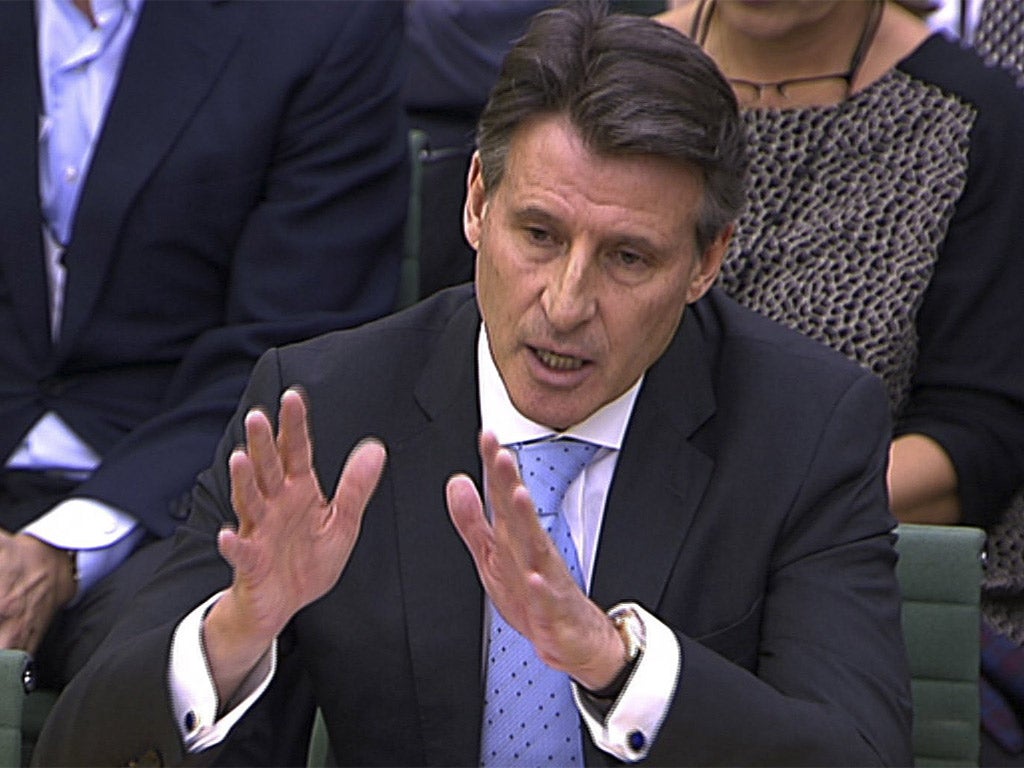Sketch: Lord Coe uses politician’s tricks to dodge and duck select committee's questions
The former Conservative MP avoids giving answers while insisting that he is totally transparent

Your support helps us to tell the story
From reproductive rights to climate change to Big Tech, The Independent is on the ground when the story is developing. Whether it's investigating the financials of Elon Musk's pro-Trump PAC or producing our latest documentary, 'The A Word', which shines a light on the American women fighting for reproductive rights, we know how important it is to parse out the facts from the messaging.
At such a critical moment in US history, we need reporters on the ground. Your donation allows us to keep sending journalists to speak to both sides of the story.
The Independent is trusted by Americans across the entire political spectrum. And unlike many other quality news outlets, we choose not to lock Americans out of our reporting and analysis with paywalls. We believe quality journalism should be available to everyone, paid for by those who can afford it.
Your support makes all the difference.As MPs in the House of Commons debated whether to bomb Syria, it seemed a particularly inappropriate time for Sebastian Coe to defend his own ill-judged “declaration of war” comment.
Coe’s one-liner – made as he was vying with Sergey Bubka to become the head of global athletics – has haunted him for the 67 days of his presidency. And, despite a three-hour grilling from a group of MPs, who returned to Parliament afterwards to vote on the rather more vital issue of Syria, the International Association of Athletics Federations president steadfastly stuck to the insistence that his comment – about journalists revealing doping in athletics – was essentially still valid.
There was a marginal diminishing in his stance when he said: “It was probably language at that time that was expressing my anger but I stick by the sentiments. I might have chosen different language.”
The implication was still that it was not misplaced despite the ensuing revelations of widespread doping in Russia, allegations of corruption at the top of the IAAF and, in the past 24 hours, revelations that 26 Italians have been banned for two years for failing to adhere to the doping whereabouts system.
The stance was similar with regards to his Nike ambassadorial role being a conflict of interest – Coe still insistent it wasn’t despite chair Jesse Norman pointing out that everyone else saw it differently – and the Eugene 2021 emails, in which Coe appeared to give reassurances to a Nike executive about Eugene’s bid for those World Championships.
It was all amid an element of pantomime: the MPs at the parliamentary select committee more obsessed with having their voices heard, while ironically Coe seemed as interested in asking questions of his own and not really getting to the crux of the answers.
There was the usual self-aggrandisement: three times he spun out one of his favourite anecdotes, that of the 11-year-old Coe taking up athletics in Sheffield for the first time. Showing a surprising amount of self-awareness on one occasion, he even apologised for one such repetition.
And all of it was played out to the farcical sight of German journalist Hajo Seppelt, whose TV documentaries have effectively paved the way for the clean-up of a sport in crisis, gesticulating wildly just two rows behind him and taking umbrage at much of what Coe said.
The former runner steadfastly believes he is the right man to lead athletics out of its nadir and he has offered total transparency, at one point saying: “I will die in a ditch for the right of media groups to challenge me”.
But moments earlier a House of Commons official had made it clear there would be no further questioning of him after the hearing and he was out of the building as quickly as you could utter “declaration of war”.
For the three hours he was questioned, it must have been like looking in the mirror for the committee, Coe the archetypal politician buying time with a question of his own or else passing the buck on more taxing issues to Thomas Capdevielle, the IAAF’s anti-doping manager who was alongside him.
But any suggestion that the former Conservative MP might get an easy ride from a committee of which half were Tories did not materialise. He was harangued about Nike, Eugene, Qatar, his failure to be aware of any potential wrongdoing at the IAAF while acting as its vice-president, and at times looked flustered, a far cry of the Coe of London 2012.
Yet again, it all left more questions than answers – and that was not really the point.
Join our commenting forum
Join thought-provoking conversations, follow other Independent readers and see their replies
Comments